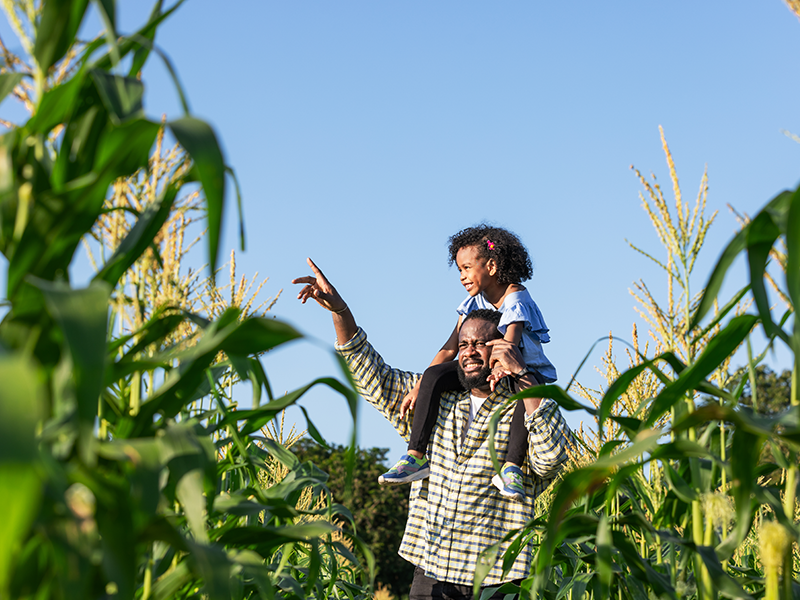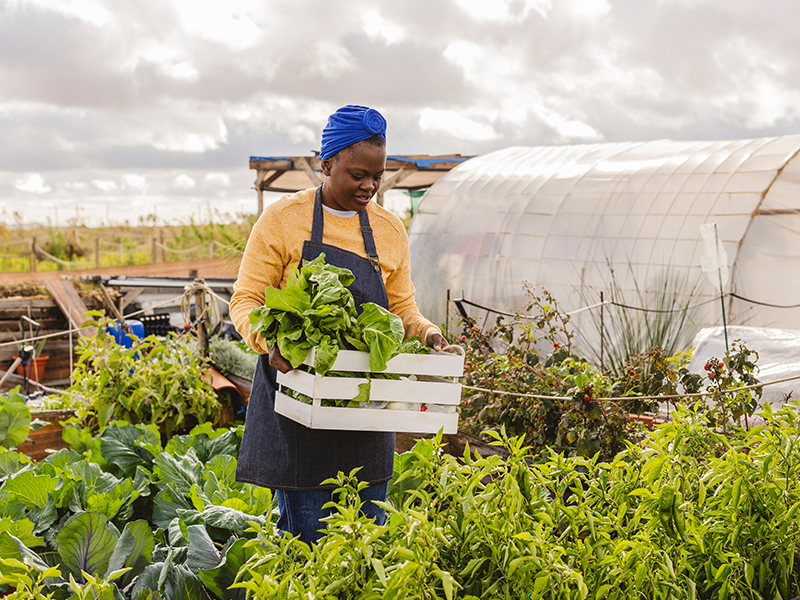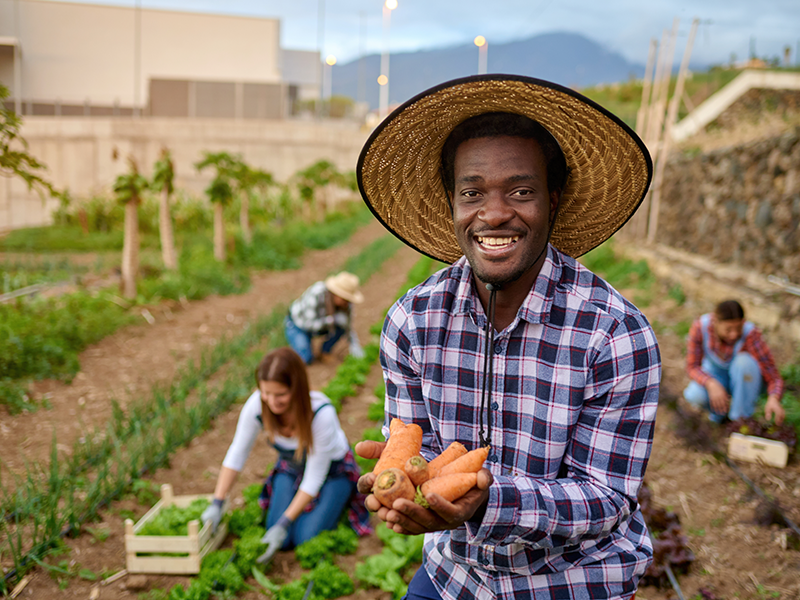By Deogratius Magero, Youth Engagement Manager, CABI
Young people in agriculture are transforming the future of food systems and advancing cooperation through technology and partnerships. Across the globe, young people are strengthening food value chains by embracing innovation and collaborating widely across borders.
In Africa, young people are becoming the dynamic engine of agriculture. The World Economic Forum reports that the sector employs more than 50% of the continent’s workforce, and over 60% of Africa’s population is under the age of 25. A tremendous opportunity, therefore, exists to harness the energy and entrepreneurship of young people. From biological control and pest management, promotion of digital advisory tools to pesticide risk reduction and spray service provision, they have the potential to revolutionise food systems in Africa.
This blog explores how young people in agriculture are becoming powerful agents of change. Together, using technology and partnerships, they are paving the way to better farming systems. In turn, their approaches are supporting the realization of important global goals, including climate adaptation, economic growth, and food security.
Driving change through agricultural technology
Young people in Africa are driving innovations in farming. Quick to adopt new tools, many see technology not only as a means of improving food security, but also as a way to build thriving businesses. With access to training initiatives, young people in agriculture are adopting and implementing new, sustainable food systems and ways of growing and selling produce. The results are improving the lives of those trained, their peers as well as others in their larger farmer communities.
The benefits of biocontrol
Take biological control (biocontrol), for example. In Zambia, biocontrol training has helped young people to manage the spread of fall armyworm while improving food safety and security. Climate change has worsened the spread of crop pests and invasive species. Fall armyworm, for example, affects nearly 98% of smallholder maize farmers in Zambia. As a result, the country faces estimated losses of US $159 million each season. Women and poorer farmers are hardest hit.
To address this, in 2023, CABI launched a three-year project with ACIAR, the Zambia Agricultural Research Institute (ZARI), and the University of Zambia. The initiative trained young people aged 18-35 in agribusiness. They learned to produce and apply biocontrol products like Fawligen and Metarhizium rileyi – innovative new technologies that offer eco-friendly alternatives to chemical pesticides. Specifically, these products help farmers to control the spread of fall armyworm more sustainably, increasing yields and protecting biodiversity.
Biocontrol is a critical part of building sustainable food systems. It reduces reliance on harmful chemicals, protecting beneficial insects and increasing yields. From farm to fork, it supports safer food production for smallholders and consumers alike.
In July 2024, 20 young people (12 women and 8 men) started training across four districts. In addition to training in agribusiness, the youths shared their skills and training with over 80 peers. Together, they formed four youth cooperatives with over 100 youth members across the four districts and set up local spray services, exploring new sources of income and benefitting around 3,000 farmers in their communities. To scale up the impact of this initiative, 45 young people from the four cooperatives have been trained as trainers in agribusiness in partnership with the University of Zambia, Zambia Agricultural Research Institute and CABI. These young trainers will now work to educate an additional 1,500 farmers on the shift from traditional farming to a more strategic agribusiness approach. Additionally, representatives from the youth cooperatives received training focused on using their cooperatives as tools for generating income. This equips them with the knowledge to leverage the cooperative structure for economic benefit, further enhancing the project’s impact beyond the direct training of individual farmers.
This novel initiative is driving tangible change by empowering youth to lead agribusiness ventures and promote sustainable pest management.
Creating impact at scale through partnerships
Across regions, young people are working in partnership to build successful agribusinesses. By collaborating with local businesses, cooperatives, and development organizations, they are scaling up their efforts and creating a lasting impact. These collaborations are not only boosting youth employment but also strengthening food systems and driving innovation in sustainable agriculture.
Collaboration for sustainable solutions
The PlantwisePlus youth empowerment work is driving a transformative movement of young people in Kenya and Uganda. Here, youths and local agricultural cooperatives are co-creating and spearheading modern agribusiness. In collaboration with a range of partners, CABI trains young people in food production, value chain development and agricultural service provision through the programme. New skills are developed in technical areas such as integrated pest management, orchard management, and spray service provision in addition to business and financial literacy.
Partnership is a central element of effective food systems because they rely on so many interconnected factors. No single actor can solve challenges within food systems alone. From food production to distribution, these systems rely on diverse expertise and knowledge.
Collaborative models like PlantwisePlus are unlocking scalable pathways to sustainable agricultural growth. The programme plays a strategic role by connecting key actors and equipping young people with the tools, skills, and platforms they need to build successful agribusinesses. Through practical training, mentorship, and support from cooperatives and exporters, the initiative empowers youths to lead innovation, strengthen value chains, and contribute to more resilient food systems.
The initiative has gone from strength to strength, boosting business growth and incomes among trainees in Kenya and Uganda. The young service providers who participated now earn up to $115/month in Kenya and $56/month in Uganda. In addition, access to loans has increased their agribusiness ventures. Trained youths are now mentoring peers, up to 4-6 mentees each and some have established agro-shops independently. Moreover, cooperatives have reported increased food production, memberships and market access.
Furthermore, the initiative has had a ripple effect throughout the community, seeing more farmers become active again. Knowledge is being shared informally through community networks, further strengthening local food systems and showing the power of partnership.
Pathways to boost young people’s employment in agriculture
Scalable and sustainable business models across specific pathways can help to drive youth employment, and technology and partnerships form important components of these pathways. These are the findings of a CABI-led review, published in CABI Agriculture and Bioscience in June 2025. The study identified six key routes to employment for young people in agriculture:
1. Agri-dealership
2. Agri-service provision
3. Green entrepreneurship
4. Market facilitation
5. Primary production
6. Value addition
The pathways are characterized by approaches such as certification schemes, collective action, contractual arrangements, and revenue sharing. They help young entrepreneurs overcome challenges that impact food systems such as access to capital and markets.
Technology and partnerships form important parts of these pathways. When it comes to technology, the study argues that digital innovations, for example, allow rapid scaling by expanding value chains into interconnected value networks. Moreover, in relation to partnerships, the study highlights how formal and informal networks are vital for integrating youth into dynamic agricultural value chains. These connections show that youth pathways are not just about employment. They are threads that can be woven throughout food systems to make them stronger and more sustainable.
Investing in young people in agriculture – the future of food security
Young people are a driving force, helping to shape the future of agriculture. Access to training, technology, and partnerships gives a valuable boost to their employment opportunities. Yet, this access also does much more – it strengthens entire food systems and safeguards food security. CABI’s programmes and projects are helping to leverage the opportunity that young people in Africa offer. Their innovation and collective action are addressing urgent challenges such as climate change and pest outbreaks. With continued investment and support, young people in agriculture will remain at the forefront of building a greener, more resilient, and more food-secure future for all.






